How to incentivize gender financing through public-private partnerships
Theme 3 of 3 from CCG's joint event with China International Development Cooperation Agency and the UN Women China Office in celebration of women's rights and achievements.
Hi, this is Yuxuan Jia in Beijing. On March 8, 2024, celebrating International Women's Day with the goal of the achievement of SDG 5: Achieve gender equality and empower all women and girls by 2030, a symposium titled "Investing in Women: Accelerating Progress" was organized at the headquarters of Center for China & Globalization (CCG) in Beijing. This event was a joint effort by the CCG, the Global Development Promotion Center (GDPC) of the China International Development Cooperation Agency (CIDCA), and the UN Women China Office.
The symposium successfully convened nearly a hundred representatives from various sectors both within China and internationally, including government bodies, diplomatic entities in China, UN organizations, financial institutions, the private sector, academia, and civil society organizations.
The full event was broadcast on domestic Chinese media platforms. It is also available on YouTube.
Readers will be welcome to check out the opening remarks, the first panel, and the second panel from our previous posts, while today's CCG Update will feature the third and final panel, moderated by Mabel Lu Miao, Co-Founder & Secretary-General of CCG, with contributions from:
Wang Yao, Director General, International Institute of Green Finance
Li Ye, Vice President, Vice Chair of the China Association of Enterprises with Foreign Investment (CAEFI), Vice President of Merck Holding (China) Ltd.
Stephen Kargbo, representative of UNIDO to China, DPR Korea, Mongolia
Zhang Fang, Head of Greater China Business Development, Luxembourg Stock Exchange
Susan Zhu, Board Chairman & CEO, Shanghai Treasure Carbon New Energy Environmental Protection Technology Ltd.
U. Nena Lekwauwa, Associate Vice President, Global Compliance, ETS
Zephyr He, Vice President of GIADA
Lily Hao, Chief Medical Officer, Arrail Plus
Moderator - Mabel Lu Miao
Your Excellencies, ladies and gentlemen, good afternoon. Welcome to our new panel, the last but not least session on "Incentivizing Gender Financing Instruments through Public-Private Partnerships (PPP)".
As discussed in the previous themes, financing for gender quality certainly has the opportunity to advance both in international development cooperation and from the public policy perspective. Given its significant and dynamic financial market, China has the potential to promote gender finance. We look forward to further discussion, dialogue, and knowledge sharing on this theme, exploring how public-private partnerships can incentivize gender financing. A friendly reminder – as the time has already exceeded our schedule, each presentation should be no more than five minutes, and the interactive responses should be limited to 2 to 3 minutes per participant.
Firstly, it's my great honor to introduce Professor Wang Yao, the Director-General of the International Institute of Green Finance (IIGF). With years of research experience in the field of sustainable finance, Professor Wang Yao is a distinguished expert in this field. I know Ms. Wang Yao is also a researcher at Cambridge University with abundant experience in this field. The IIGF has established a close partnership with UN Women. In 2023, IIGF collaborated with the UN Women to conduct a landscape study on financial support for gender equality and women's empowerment in China. This study summarized international and domestic measures in the financial sector to support gender equality and explored innovative concepts and pathways for gender finance products.
This year earlier, IIGF and UN Women cohosted a workshop titled "Navigating Gender-Inclusive Finance for a Sustainable Future," which provided a platform for facilitating exchange, sharing, and jointly promoting the development of gender finance in the Chinese market. It's evident that IIGF has long been committed to advancing "the Power of She" – I love this concept – in green finance, conducting various studies and activities related to gender financing.
Given your expertise in sustainable finance, could you share with us how sustainable finance or climate finance can contribute to gender equality? And what are the opportunities and the challenges, especially (when we) look at the commitments made in the most recent COP? We know some of our participants have already participated in the COP in different countries in the past years, where gender action has also been agreed upon. The floor is yours.
Wang Yao, Director General, International Institute of Green Finance
Thanks for the invitation. Thank you for giving me the opportunity to exchange ideas with outstanding women and men interested in women's development on such a special occasion.
Before answering the question of the moderator, I would like to comment on previous sessions. First, SDG 5 is a basic element for sustainable development, but unfortunately, there is no country that has achieved gender equality, especially in the financial sector where women receive relatively limited opportunities. In addition to the statistics provided by experts in previous sessions, I would mention that the World Bank issued the Women Business and the Law 2022 report. According to the report, 2.4 billion working-age women do not have equal access to economic opportunities. An ILO (International Labour Organization) report also shows that the female labor market is only 75% of the male market. We know clearly from Claudia Goldin, the Harvard professor who won the Nobel Prize last year and whose research has also demonstrated that in the past years of economic growth, the increase of job opportunities for women was actually not proportional to the economic growth. So gender equality is still an issue to be addressed. We also know that closing the gender gap is going to produce great potential for GDP. A study shows if women's employment increases, it can bring an extra 6 trillion USD to the GDP. In contrast, the global GDP will lose 16% if the gap further widens.
And we also discussed today that gender financing has already achieved progress in public policies. But when it comes to sustainable finance, we know that finance can support women's development in various ways, including widening women's access to financial services, which is also one of the issues that we face in the financial sector for gender equality. Moreover, another key issue is the poor awareness of the regulation system, financial system, enterprises, and other stakeholders on integrating the concept of gender equality into their service. The second issue is about the relevant policies and standards in the financial sectors. Ms. Xing has mentioned some measures in the fiscal aspect, but when it comes to financial policies, instruments, and toolkits, despite products that support and target women - heroine loans (巾帼贷), or women's loans for example - only a small share of financial products are for women. So we lack standards set by policies and tools for targeted support. Tamas also talked about data or quantification in the financial sector. The reason why the financial system cannot target women right now is that the system does not have data about their financing needs. Also, even PPP lacks the mechanism to provide targeted support for women. With this absence, sustainable finance can provide improvement in a variety of ways, one of which is to increase women's access to financial services. There are barriers such as property ownership and educational background. As Mr. Yang said, for the Renmin University of China and Central University of Finance and Economics, there are more female students at both universities – but at a more general level, the level of women receiving higher education is still lower. And there are also social and cultural elements as well. We need to provide more opportunities through education and training so that they can master more financial knowledge and we can develop more women-targeted and friendly products and services. We can also encourage financial institutions that adopt gender-differentiated policies, for example, policies for gender-equality-based loans, female employment, and entrepreneurship.
For the latter two aspects, the challenges are the shortage of experience, resources, and funding. Sustainable finance would be able to support the following aspects. For instance, in terms of financing support for women entrepreneurs, an example is the "10000 women" project by Goldman Sachs, which was mentioned by Ms. Dong and we've been following up on this project. So we've discovered the project has helped women entrepreneurs grow their micro and small businesses into, sometimes, listed companies by providing further skills training, which is really essential.
Another important issue is equal pay for equal work. I'm actually the mentor of a lot of both male and female graduate students. I often tell the boys that they don't have to worry about finding a job because it is way easier for them than girls. This is a vivid example of women facing inequality in employment. Moreover, sometimes a female candidate is actually better than another male candidate, but the employers would prefer the man because they're worried that the woman will get married and take maternity leave, etc., which could influence her work performance. So we really need financial policies and tools in place to support women's employment.
In addition, sustainable finance can also bridge the gender gap in income. At the moment, women earn less than men universally due to women's disadvantaged positions in education, employment, and resource allocation. So we need to improve women's education and skills so that women can acquire better-paid jobs and wider sources of income. Sustainable finance can also push forward the development of society. I couldn't agree more with Mr. Yang at the end of his speech that the enhancement of women's status represents the civilizational progress of a country. If you can help with women's economic empowerment, you can also promote the whole process of gender equality. Therefore, enhancing financial services is a very important sign of gender equality.
Then for the second question proposed by Dr. Mabel, in COP28 which just concluded last December, we have seen a lot of initiatives pushing forward gender equality. And yes, indeed, we have a lot of existing initiatives helping women obtain more rights in engaging in climate change campaigns. However, there are still a lot of challenges. Firstly, women are still quite limited in the decision-making process, be it in local governments or organizations. Their influence is relatively limited on policy-making and allocation of resources. Therefore, it is essential that women can have more presence in the decision-making process.
Another challenge is that although people's awareness has been raised for including gender factors in promoting climate economy, green economy, and sustainable economy, female empowerment resources targeted at the gender gap are quite insufficient in campaigns concerning climate change and biodiversity protection. For instance, in asset management, at the moment, there are about a total of 100 trillion dollars of assets under management globally, among which we discovered that there are very few investments dedicated to gender equality. We have heard from AIIB's (Asian Infrastructure Investment Bank) experts as well as our financial experts that the projects they engage in may have such indicators concerning gender-based investments. However, generally speaking, investments and services dedicated to women are still very lacking.
In addition, in terms of climate change, especially disaster prevention and control, how can we improve women's adaptability to disasters while considering their features in this area? This would still require a systematic resolution, and we need to improve those on all fronts.
Moderator - Mabel Lu Miao
The remarks from Professor Wang was very wonderful. We need to use more financial instruments to empower women and enlarge their capabilities and capacities. Thank you very much.
Next, I would like to welcome Ms. Li Ye, who is the Vice President and the Vice Chair of the China Association of Enterprises with Foreign Investment (CAEFI) as well as the VP of Merck Holding (China) Ltd, a well-known multinational. With her wealth of corporate experience and perspectives on foreign investment, I'm confident that her insights will be invaluable to all of us.
We know the "Healthy Women, Healthy Economies" initiative by Merck Holding aims to improve women's health and unlock their economic potential. This initiative will empower women and their families to participate and thrive in their communities, ultimately enhancing their quality of life. So I would like to ask Ms. Li that since Merck has signed Women's Empowerment Principles (WEPs) with the UN Women and as the Vice President of Merck Holding, what strategies have you found successful in encouraging companies to engage in gender equality initiatives? Furthermore, as the Vice Chair of the CAFEI, a big group of multinational companies in China, how do you leverage your role in foreign investment association to guide companies in responsive risk fundraising? How can companies be effectively involved in impact financing?
Li Ye, Vice President, Vice Chair of the China Association of Enterprises with Foreign Investment (CAEFI), Vice President of Merck Holding (China) Ltd.
Thank you, Doctor Miao, for inviting me and also inviting Merck to contribute to this important topic "Invest in Women: Accelerate Progress."
Merck is a leading science technology company. We have a 350-year history. We provide medicines to global patients. Around 10 years ago, Merck wanted to do more in medicine solutions and give to patients - more than engaging in the public sector to help the government form the policy toolkit but also to contribute more as a funding sector as well as a partner of women's health. With the Asia-Pacific Economic Cooperation, we cooperate with the governments of the United States and the Philippines. We started the "Healthy Women, Healthy Economies" initiative.
We find that the gender gap has really a big potential to unlock the power and potential of women around the world. There are some staggering facts that we discovered. For example, there are 860 million women across the globe who are not reaching their economic potential due to preventable causes. There are also 28 trillion estimated amounts that would be added to the annual global GDP by 2025 if women could participate in the economy at the same level as men. Also, it is a shame that, according to the World Economic Forum's Global Gender Gap Report, it would take 217 years before women can reach equal pay in the workplace. Noncommunicable diseases (NCDs) account for almost 65% of women's deaths globally.
Those numbers mean we will have more responsibility to do better. And healthy women will lead to healthy economies. So we advocate that women would have access to health solutions and awareness of the options available to them to advance their health and wellbeing. And also in a lot of global countries, we want to reduce severe detriment to women's health by trying to balance family and workplace responsibilities. So in China and a lot of countries, we started an initiative called "The Embracing Carers" because we found that in the workplace, professional women will not only need to deliver the work, but also need to take care of their elderly family members, parents, toddlers, their husbands, and their loved ones. Sometimes it will cause anxiety and distress. And sometimes it's not possible for them to get treatment in a lot of countries. So Merck donates medicines, especially facilities, and thyroid disease medicines, and also gives some free medical treatment, the TSH (Thyroid-stimulating hormone) Test, for screening thyroid diseases.
And in China, we found there are a lot of women suffering from difficulties with infertility. One out of ten couples in China now have difficulty in conceiving. So infertility is also quite widespread. Then we collaborated with the Woman Development Foundation years ago. We started a collaboration program to donate infertility medicines and provide counseling hotlines to support women who have infertility problems.
So health is an issue, but we also feel that multinational companies really have the responsibility to advocate for women in leadership and diversity. We set up some principles that not only in China but in every country, 50% of the leadership roles need to be female. For all the important talks, we need to place some women as speakers. A diversity council needs to be set up in the management team to advocate for this cause.
It is not just Merck. When I worked for other multinationals, there were a lot of companies similar to Merck. We started the women's initiative and women's empowerment several years ago; we started to really work our talks to place female positions in leadership roles. In Merck, our CEO is a female. Out of 350 years, it is the first time that we have a female CEO globally. While we are a traditional German company, our CEO is from Spain. And also she is a woman doctor. After that, our CFO is a woman. Also, our Global Health Senior Vice President has a German background and is a female as well. Also, after COVID, our China Healthcare Managing Director is a female as well. This is not only happening to Merck, but we notice that in a lot of other companies, from Novartis, Novo Nordisk, Bayer, and Bristol Myers Squibb, after COVID in China, their managing director positions all changed to females. I think that is because maybe females are better at multitasking, communication, collaboration, empathy, and also patience. Those qualities are very important for the leadership nowadays. So diversity issues and women in leadership are what we are consciously investing in. We are not afraid of risks. Also, we want to empower women to make their own decisions – business decisions, serious decisions involving lots of dollars – and let women make those decisions. So basically, we do our part. We contribute to this theme by implementing our KPI and our business decisions. Thank you.
Moderator - Mabel Lu Miao
Thank you, Ms. Li, from Merck Holding. It's quite impressive - what you said about more female positions and leaders in China's multinational companies. I know some of your colleagues. Many of them are female leaders who are quite impressive and doing a very good job. And I met your CEO, a female CEO, at the Munich Security Conference. That is a hard conference, but the soft part inside is its female leadership. Thank you very much.
I am delighted to introduce Mr. Stephen Kargbo who serves as the representative of the United Nations Industry Development Organization (UNIDO) in China. We look forward to his perspective on gender equality issues from the standpoint of industry development and support to SMEs. I would like to ask a question to Mr. Stephen Kargbo: What are the experiences or practices that can be used in improving financial inclusion through investment and support for small and medium-sized enterprises and in women's economic empowerment? And how is that related to gender financing?
Stephen Kargbo, representative of UNIDO to China, DPR Korea, Mongolia
Thank you very much. The conversation has been about public-private partnerships. I confess I have to make a disclaimer that I'm neither from the public sector nor from the private sector, but I'm from an international organization that is very close to the private sector. Therefore, I, first of all, want to acknowledge by way of preamble that some of the points that have been made – gender equality and women's empowerment – are not fable; it's good for the whole of society and the industry as well. You need to stand for inclusive and sustainable industrial development. There are papers, there are publications that demonstrate that gender equality and women's empowerment contribute to the increase of GDP and the boosting of innovation because as the previous speakers said, they come with different perspectives and different problem-solving capabilities. It's also been shown that even for sustainable development, women tend to invest more in greener industries than in conventional industries. So I think this is something we need to acknowledge and understand.
However, I want to, by way of the proposition, say that while financing for women's empowerment and women's economic development is crucial, UNIDO's proposition to take a more comprehensive approach. And I think we need to underline this very strongly that financing only important assets may not be sufficient to reduce gender disparity. It's about capital on one end, which is what financing is focusing on – whether it's financial or technological capital, but it's also about capacity building. This is why our interventions – no matter the level of funding we inject – always have to go with a strong element of capacity building. And for that matter, a strong element of collaboration. Oftentimes, the question of building coalitions among different business entities is a question of ensuring there is proper coordination between different entities that are at play. So I think this comprehensive approach recognizes that it's not just about capital, but also about capacity building, and more importantly, also about collaborative efforts, which is why we're here today essentially, to have this exchange and make sure that we work on collaborative frameworks.
However, if you want me also to give, as you have requested, some specific examples of where we have worked and – I wouldn't say PPP, but – where we have leveraged public structures and public funding with our own grant-related interventions to make sure that issues of women's empowerment are taken into consideration, I will give you particular examples. First of all, here in China, we have just completed recently the rehabilitation of small hydropower stations in China – almost 20 of them are really age-old, very old ones. We did this with the Ministry of Water Resources - this was a joint project, and we dealt with it in different provinces. The thing I want to highlight is that we ensured at every stage of the implementation of this project, right from training up to the level of management representation in the oversight of the small hydro powers, that women were involved and women were playing a key role. So I think from an institutional perspective, this is very important. Of course, I've heard – and congratulations to my colleague Beate– about the level of gender focus and women's focus that they have achieved in programming. Also, I think for us in UNIDO, we have worked very hard in that respect on programming and making sure - it used to be 17%, which is probably now close to 50% - all projects have to undertake gender focus elements in their design. So it's a tough call, but this is exactly what has been required of us, including in panels. We don't have male-only panels anymore. We have to have this balance.
So this is one example. Another example I could give you is a project we did in the automotive industry in India where also the elements of gender empowerment were key in the training of women in skills that are normally male-dominated. I want to emphasize that in our intervention, we not only focus on areas that women are normally popular with but also try to change the narrative to put women in places where they would normally not be expected to be, in the automotive industry. So the case of India is one specific case where we have achieved that.
We're also working in the MENA region, Middle East, and North Africa, where the representation of women-owned businesses is about 5%. It's really low. So our approach there is more from a forum perspective – bringing in different business leaders, and linking them with international business leaders so that they can exchange ideas and build successful innovations.
In Tanzania, before coming here, we have also worked on specific grant mechanisms that are designed to support – first of all, women-included programs – but more importantly, women-led – and even more importantly, women-owned businesses, because I think there are three levels of inclusion that we can talk about, and I think women-owned is probably the best, if we move from women-included, women-led, and woman-owned. So there we have a grant mechanism that is performance-based for waste energy developers where we really give special access to women-owned and women-led businesses. So we can give you details on these specific interventions. But I think, by way of examples, these are some that I would say. And so inclusive financing, but more importantly, emphasizing a comprehensive approach is very crucial to include capacity building as well as the building of collaborative mechanisms and frameworks. Thank you.
Moderator - Mabel Lu Miao
Thank you, Mr. Stephen Kargbo, from UNIDO. You remind us that not just women should be at the table, they should also deliver the speech. Women be invested should invest in the future and invest in other fields. So it is important that women are in business themselves. You spark the light and inspire us.
Let us move on to another speaker. It is my pleasure to introduce Ms. Zhang Fang, the Head of Greater China Business Development at Luxembourg Stock Exchange, and she will join us online. With years of invaluable experience in Chinese financial institutions across both China and Luxembourg, Ms Zhang Fang brings a wealth of expertise to the realm of stock exchange and sustainable finance. In 2022, UN Women and the Luxembourg Stock Exchange signed a MOU to collaborate on gender bonds. The Luxembourg Stock Exchange marked a significant milestone in the realm of sustainable finance when it established a dedicated gender-focused bond on its leading platform for sustainable finance, which is called the Luxembourg Green Exchange.
By dedicating to women's empowerment, the bonds are now easily identifiable for investors passionate about driving positive social change. This groundbreaking initiative was a part of the broader commitment to fostering gender equality and women's empowerment. So Ms Zhang Fang, could you please share your insights on how stock exchanges can better contribute to SDGs related to gender Equality? Please also share the Luxembourg Stock Exchange's initiative on gender-focused bonds: what it is and how it is related to gender financing.
Zhang Fang, Head of Greater China Business Development, Luxembourg Stock Exchange
It's a great honor. I would like to thank the invitation. On behalf of the Luxembourg Stock Exchange, I'm glad to share my ideas from the perspective of a financial infrastructure on such an important occasion. We're a world leader in bond listing and home to the Luxembourg Green Exchange (LGX). We're the world's first exclusive platform for sustainable securities trading. Our mission is to promote sustainable investment practices and to help direct flows of capital to support sustainable projects and strategies.
In the context of our recent efforts in gender-focused finance, it is my great pleasure to share some insights on how stock exchanges can better contribute to the realization of UN SDG 5 on general equality and female empowerment. As you know, the stock exchange gathers issuers and investors, and it can direct capital flows to projects promoting gender equality and women empowerment and help achieve SDG 5. For those financing projects benefiting women and girls, the Luxembourg Stock Exchange (LSE) gets them listed with a set of specific flags to present these sustainable investment opportunities to investors worldwide. LSE also advances gender lens investing (GLI) and supports issuers in promoting such bonds to the international capital market to increase their visibility and publicity. We also promote gender-based financing through information releasing to improve transparency and credibility. In 2022, we signed a MOU with one of the cohosts of today's symposium, UN Women – the first step into gender-focused finance. We commit to jointly promoting gender finance and GLI to support women's equal opportunities for economic activities. That led to us creating new flags for gender-focused bonds, highlighting sustainable securities that are advancing purposefully and actively gender equality agenda on the LGX platform.
So what exactly is a gender-focused bond? It could be a social bond, sustainability bond, or sustainability-linked bond (SLB). Those who allocate all or part of their funds to projects and strategies that contribute to achieving gender equality, and women empowerment, and are dedicated to SDG 5, while also disclosing post-issuance reports including use of proceeds reports and impact reports. Such sustainable debt financing instruments will be flagged as gender-focused bonds. Today, issuers from all over the world, such as the African Development Bank, the European Commission Development Banks, the International Fund for Agriculture Development, and others have listed nearly 70 gender-focused bonds on LSE. We're very proud to be able to flag these products on LGX, offering a chance for the public to better know those bonds' financing projects and strategies. Our goal is to make it easier for investors to identify financing instruments and investment opportunities that are dedicated to supporting women and girls while encouraging more issuers to make or highlight their contributions to gender equality and female empowerment. And just today, on a ceremony for International Women's Day in Luxembourg, we celebrated the issuance of a gender-focused bond on LGX by an Argentinian nonprofit organization Pro Mujer that raises funding to offer loans to some 1,700 low-income female entrepreneurs in Argentina. This is just one of the many examples that these bonds benefit the real economy, gender equality, and women's empowerment.
Moderator - Mabel Lu Miao
We have just heard from Ms Li in terms of women's role in the Luxembourg Stock Exchange and from our management team to our members and our mid-level managers, we have seen an improvement in the percentage of women as well as female speakers participating in panels. For instance, if the panelists or the opposing sides put forward male speakers, the Luxembourg Stock Exchange would put forward women to take this speaker role. In terms of developing our work – and not only that – we have enabled our platform and in our class, we have dedicated a gender finance course. This is to help the participants to understand the capital market to realize gender equality. And in the meantime, through LGX and system services we support the capacity building and we help issue gender-focused bonds and other sustainable bonds at every step of the issuance process. It is critical that we build awareness and understanding of gender finance in the broader financial community to work jointly and bring gender-focused investment opportunities to the market so that we can pull our resources together in promoting gender equality and female empowerment through finance. Thank you very much, and we look forward to more market participants working with us and with LGX.
... president of the Great Bay Area Carbon Neutrality Association and the VP of the International Green Economy Association. I know Susan did very well in the carbon neutrality circle and is a very successful female as well as a carbon neutrality investor. So, Susan, I would like to ask you, as a successful female founder in a male-dominated field, how do you perceive gender equality in the entrepreneurial field? For example, do women have equal opportunities in accessing capital resources? You can have your example. Additionally, what opportunities do you see for climate financing and promoting gender equality?
Susan Zhu, Board Chairman & CEO, Shanghai Treasure Carbon New Energy Environmental Protection Technology Ltd.
Thank you, Dr. Miao. I'm delighted to have the opportunity to discuss carbon trading today. This emerging sector is gaining traction globally, yet remains unfamiliar to many. Notably, carbon reduction initiatives involving women and girls have shown increased popularity. For instance, recently in low-income countries, we have worked on carbon reduction projects. In fact, I just came back from Mongolia. In some African and Southeast Asian countries, we have invested in energy-saving stoves and LED headlights to help women, as we know that women play a very important role in their families, particularly in cooking and handicrafts. Interestingly, the compensation for each ton of carbon reduced generally is about 7 USD. However, for projects specifically benefiting women and girls, this figure can soar to between 15 and 45 USD per ton, highlighting the significant value placed on gender-focused sustainability initiatives under SDG 5.
Of course, our company, specializing in international investment, prioritizes projects safeguarding women and girls. Just now, we have also heard from many of our experts in terms of how to protect women and how to protect the outlook of women and girls. This aligns with my firsthand experiences. The shift in the global economy presents numerous opportunities for women, especially in the context of transitioning from traditional energy sources like coal to renewable energy. This transition not only protects women's health but also opens up new avenues for employment.
We have also observed a growing interest in energy-saving and environmentally friendly initiatives. Women's participation in projects in agriculture and green sectors is particularly encouraged, supported by both governmental and non-governmental capital. Recent discussions with government representatives, like my visit to Cambodia two weeks ago, reveal a strong interest in investing in such initiatives at competitive rates.
Also, Ms. Wang mentioned about education in the past few years – we have worked with many NGOs and many universities to carry out training programs, aiming to increase women's participation in capacity-building and social sustainability, thereby improving their livelihoods.
This is my personal observation. As a female entrepreneur – this is the 14th year for my entrepreneurship – throughout the development of our company, the integration of ESG principles and sustainable development into our company has led to an increased presence of women on our board. We would tend to hire a higher proportion of females to help with our company's efficiency and sustainability. In the interest of time, perhaps I'll stop here.
Moderator - Mabel Lu Miao
I think as time is limited, we would like to conclude this panel, but there are three interactive speakers. Firstly, I would like to invite Ms Nena Lekwauwa, Associate Vice President for Global Compliance of ETS. We know it is a well-known education company. We would like to invite you to say something as time is limited – maybe 1 or 2 minutes. Thank you.
U. Nena Lekwauwa, Associate Vice President, Global Compliance, ETS
I think some of the takeaways during this talk are really about enabling girls and women to tap into potential and then enabling human progress. And that's at the core of ETS's mission to provide educational equity around the world. So as I am thinking about partnerships between private and public, I think it's in the spirit of focusing on education, looking to partnerships with companies that want to do this in a commercial context and also bring thought leadership innovation to delivering programs, to helping and partnering with you in building frameworks and processes that deliver measurable, evidence-based research-backed results so that we can use this in supporting policy development and supporting our partnership again in business. Thank you.
Moderator - Mabel Lu Miao
Thank you. Let's move on to Ms. Zephyr He. Zephyr He is the vice president of GIADA. Now the floor is yours.
Zephyr He, Vice President of GIADA
Thank you, Ms. Miao. I am delighted to have this opportunity on behalf of GIADA as well as Jana Garden to sponsor this event today. I hope that you enjoy the snacks and tea break that we have provided, it's a treasured opportunity for us to hear from the ambassadors and to talk at the microeconomic level. And from GIADA's perspective, I'd also like to supplement – and for GIADA in terms of the industries that we're in – and it is perhaps quite different from some of you guys. We're in the luxury dining and fashion area, and we're very friendly towards women.
Just now we have heard from Chatterjee and he talked about Chairman Mao mentioning that women hold up half the sky. And in our company women support all the sky. About 80% of our managers are women and this is something that we're very proud of. We believe that all the policy issues should come from the companies and then influence our consumers of GIADA. And as a luxury brand, and in terms of our marketing, we do not really focus on the product; rather it is more about building up a women's community. This is about women's leadership and they can have insight into this. Every year we will have GIADA Academy and this is our mega event annually. And we invite all these elite women to come and talk about culture and knowledge. In addition, we also have a podcast and it is hosted by Ms. Chen Luyu who is a very famous hostess in China. And we invite different women to come and talk about their experiences. From the economic and financial perspective and the mindset, we also provide women with a lot of ways to help them break through stereotypes, to be brave, to be them, and to be who they are. In terms of our brand, we have a spirit that continues to blossom. We wish all women a great day today.
Thank you very much for your sharing. We also have Dr. Hao and she is a very famous doctor. She is from Arrail Plus. Chief Medical Officer, Lily Hao.
Lily Hao, Chief Medical Officer, Arrail Plus
I have already been working as a dentist for nearly 35 years. So I'm very glad to meet everybody. You are so talented. You are all elites. So I feel I'm so lucky to learn a lot from you. I know nothing about investment. I don't know any numbers. I'm not good at numbers at all. But I think health is the most important thing for everybody. So I would like to say – I know you're very busy – maybe you can spare 3 minutes every day to brush your teeth and take good care of yourself; every 3 or 6 months you can spare maybe half an hour to visit your dentist, to do regular checkup. And hopefully, you can have good health. Also, I have been a dentist for so many years. You do a lot of things I cannot do, but I'd love to do anything to the kindergarten and school students, to anyone. If you need anything I can do, I'm right at your service. Thanks, everybody.
Closing Remarks
Moderator - Mabel Lu Miao
Thank you. How time flies. We have to conclude this session, but I think it's a very successful session. And as we draw this symposium to a close, I'm delighted to reflect on the success of today's gathering.
Distinguished guests, today we're highly represented from different sectors, including from OECD, UNDP, UNFPA, and other UN family organizations. And of course, we have a lot of quite impressive ambassadors to China, including South Africa, Rwanda, Mozambique, the EU, and Canada. We also have Chinese government representatives from NDRC, the Ministry of Finance, and the China Women's Development Foundation. During the seminar, I am quite impressed by a lot of opinions on how to empower and finance women through instruments and approaches. We shared practices and abundant experience to empower women from policy-making, from the private sector, from public policies, and of course, from international cooperation. So it's quite an important occasion today. I cannot point out everybody's points, but for me, it's quite an important day. And I think everybody here learned a lot. Today's meeting is about the importance of investing in women from several perspectives, including international development cooperation, public policy, and public-private partnership. We had three sessions touching upon those different themes. It is quite impressive agenda-setting. Thank you, Smriti. Under your leadership, we set up such a well-organized and productive agenda.
Additionally, cross-sector efforts can be strengthened in China through various strategies.
First, partnership among the government, private sector, civil society, and academia to leverage resources and expertise for investing in women.
Introduce financing incentives or subsidies to encourage businesses and organizations to invest in women's education, training, leadership, and entrepreneurship. I remember Ms. Yang mentioned that in the Chinese government, we still lack a kind of department dedicated to gender equality.
Thirdly, utilize data and research to identify gaps and opportunities to invest in women across various sectors. How to mobilize, coordinate, and align itself is very important. Establishing mechanisms for monitoring and evaluating, just as the EU representatives and colleagues from the UN system mentioned, monitoring and evaluation are very important as well. We should establish a mechanism to do something and ensure accountability and continuous improvement.
Looking ahead, I hold firm in my belief, that our collective efforts will propel us towards a more equitable and prosperous world through financing girls and women to empower girls and women. I would like to once again extend my sense of gratitude to our long-term counterparts and cooperative partner Smriti from the UN Women China office. You did a very good job and leadership for gender equality.
Furthermore, I wish to express deep appreciation to the UN family organizations, UNDP and UNFPA, and of course, ambassadors to China. And representatives from academia, you're well-known scholars, and thank you for taking the time to share your opinions with us. It's quite impressive. I would to acknowledge the hard work of UN Women in China, your great team, and of course the CCG team, the Global Development Promotion Center team, and our colleagues Cai Jing, Ann Tang, and colleagues from UN Women. Thank you all for your dedicated efforts. Without you, we cannot hold this wonderful event. Let us carry forward the momentum generated by today's discussion and continue today's event. Spark the light. And I remember that one of you mentioned Nelson Mandela – the wonderful sentence is "Empower women, empower the nation," which is our continued aspiration.
Thank you very much.







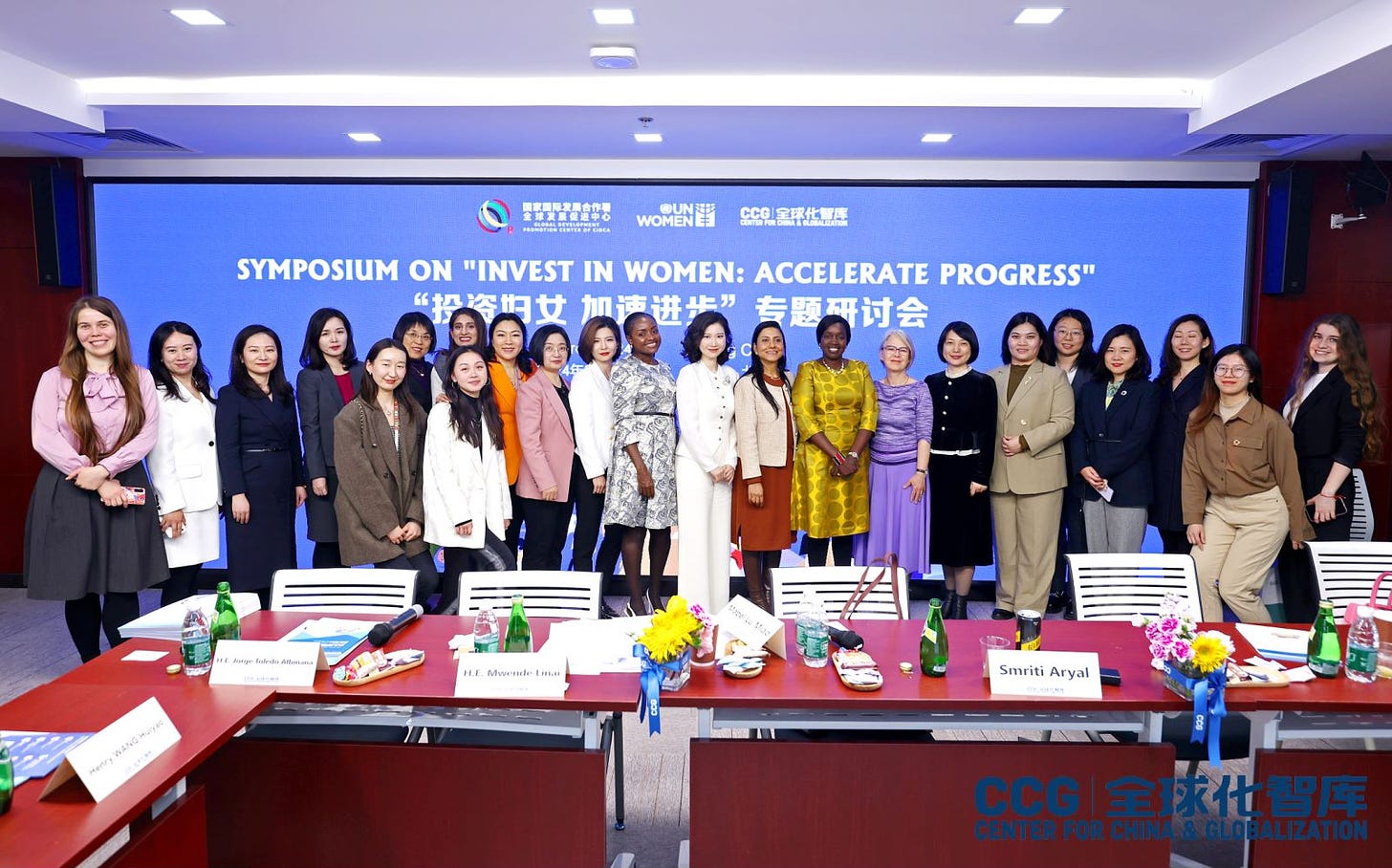
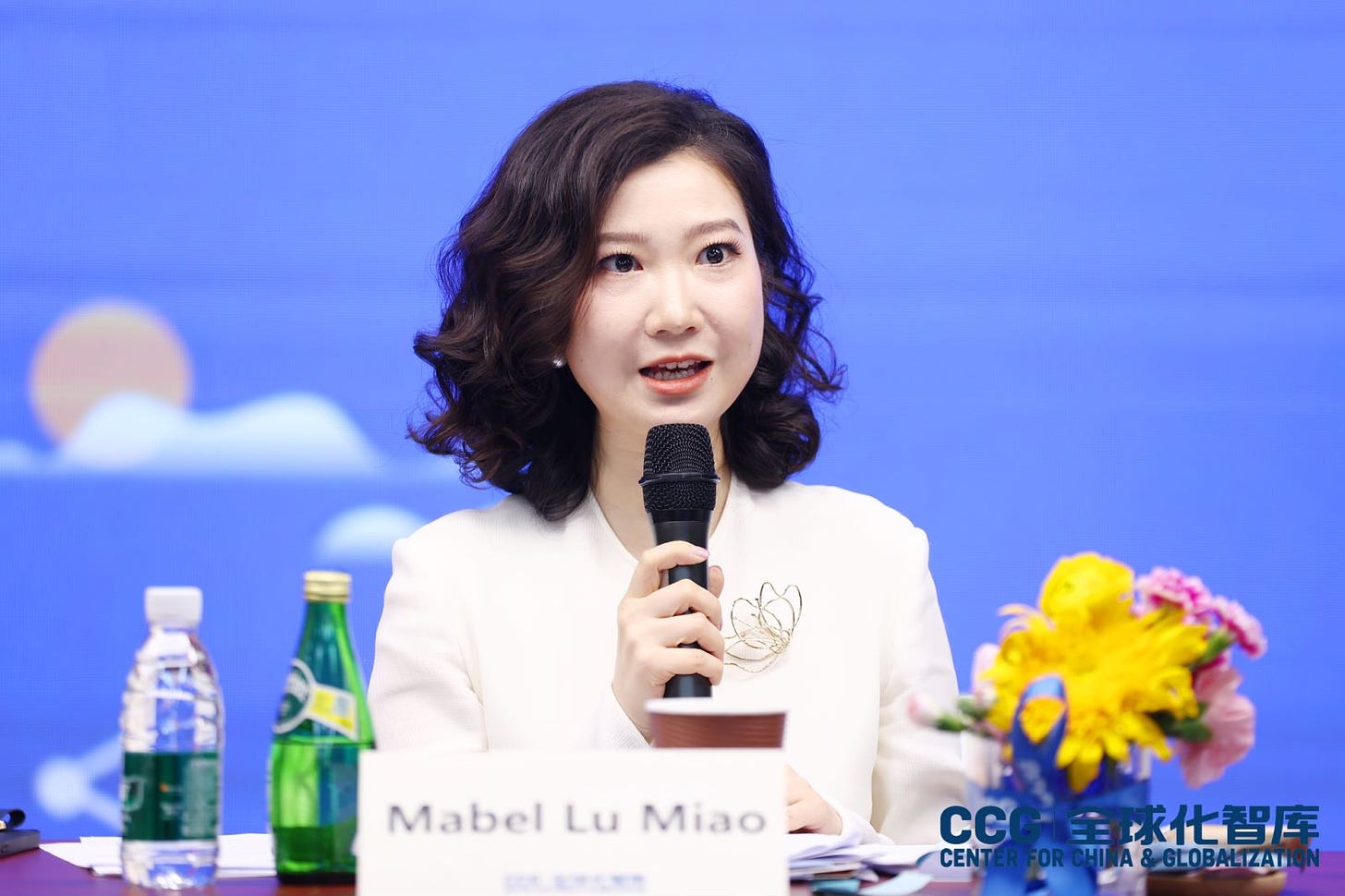
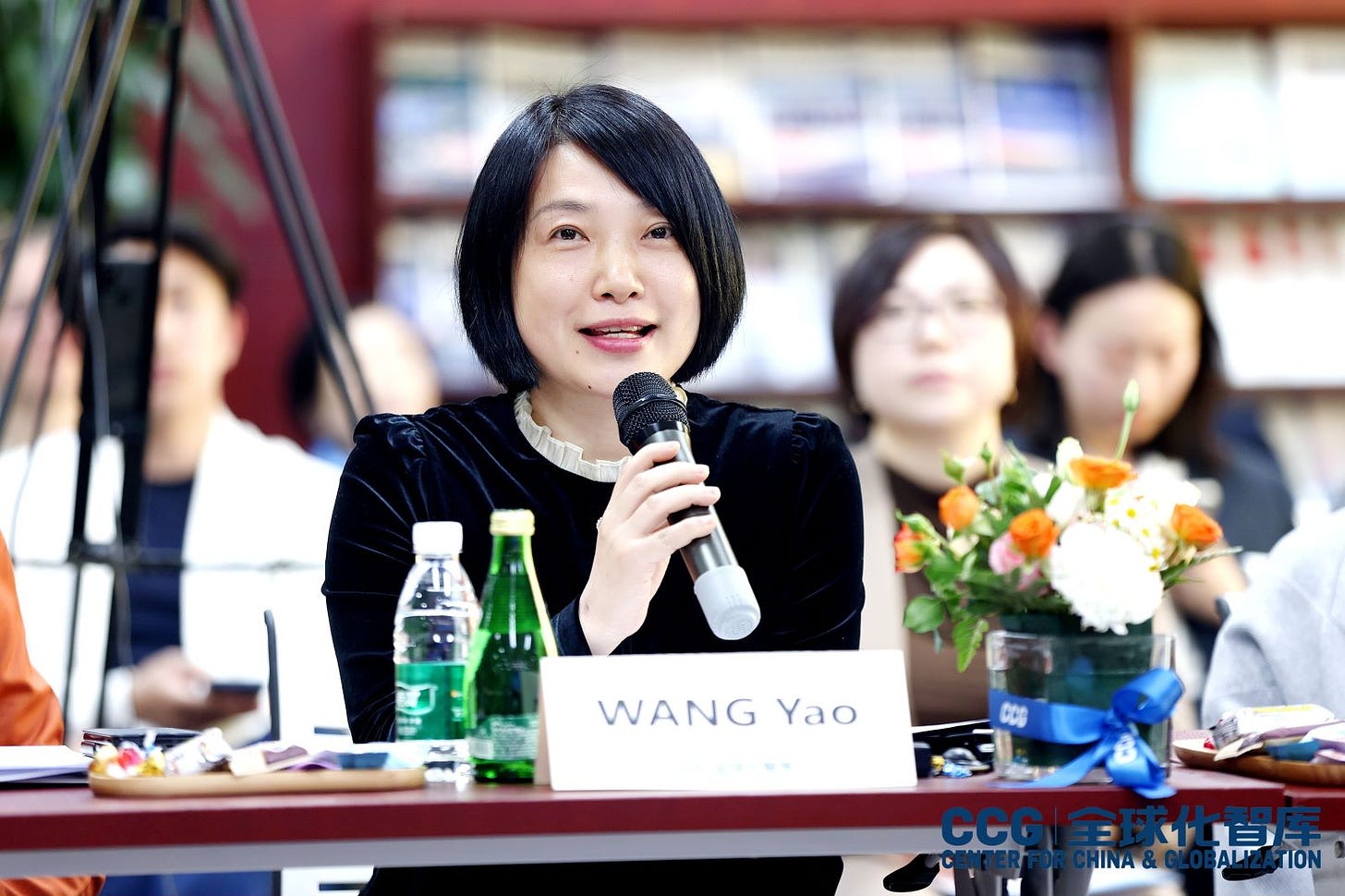
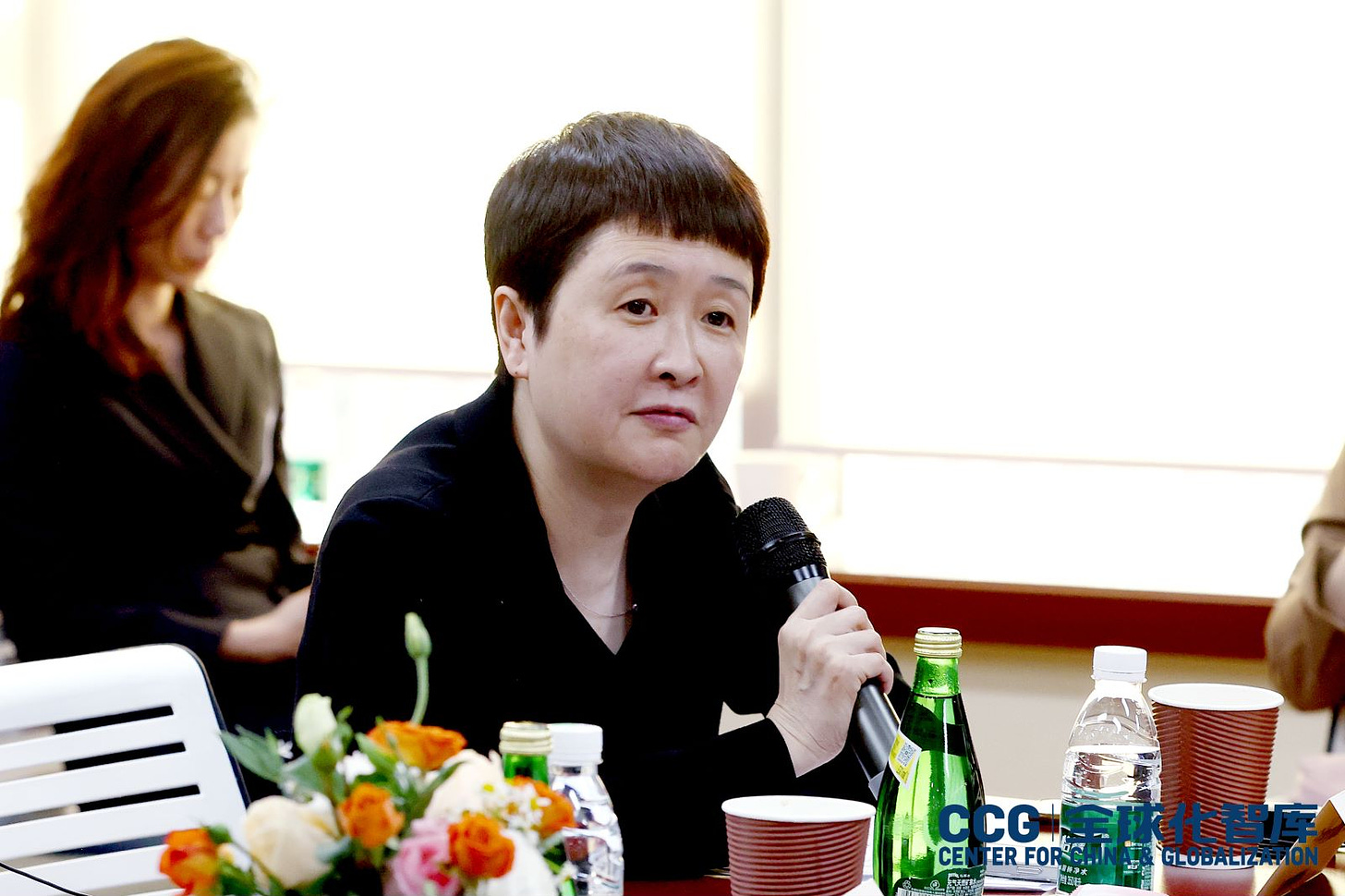
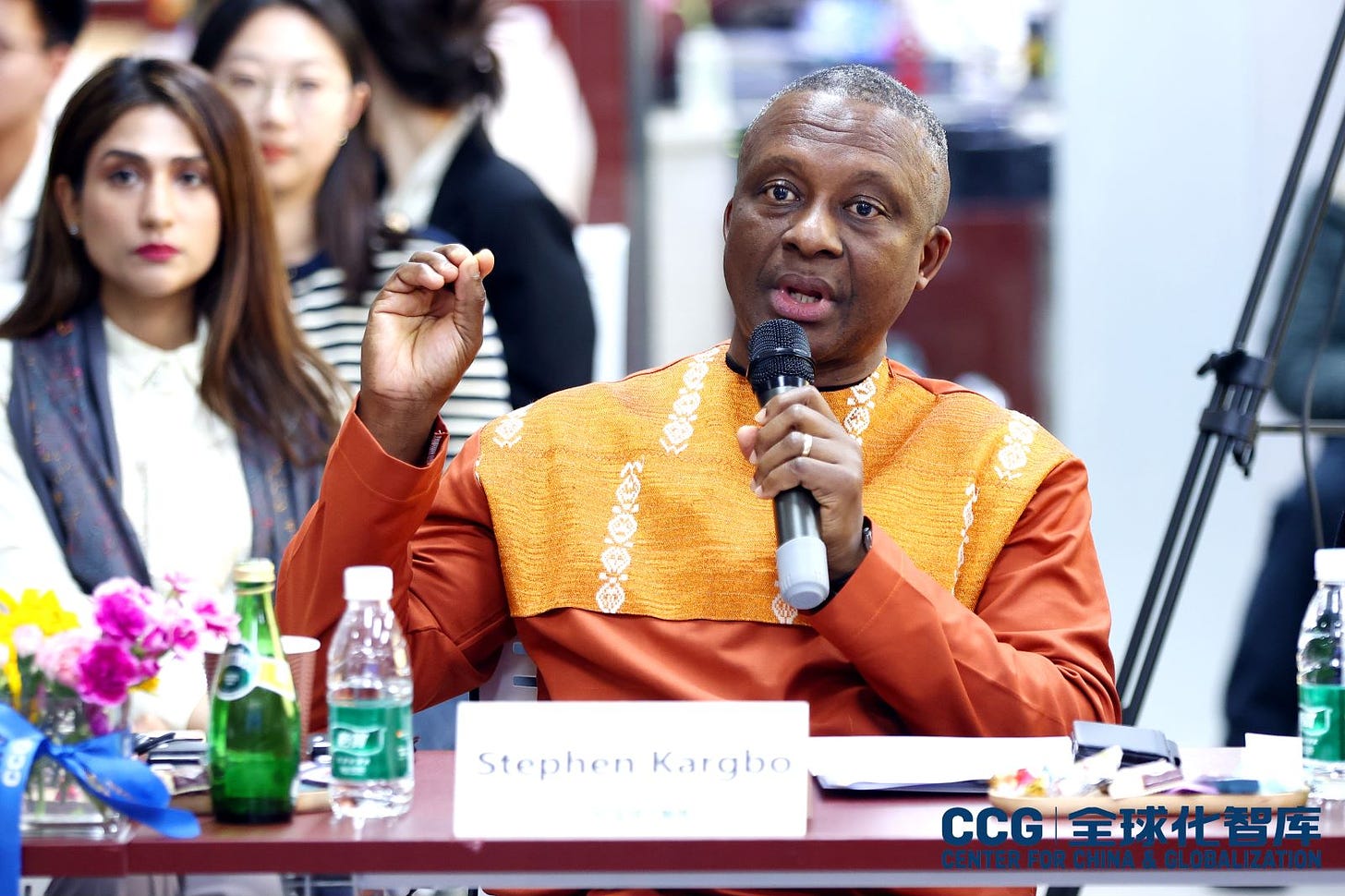
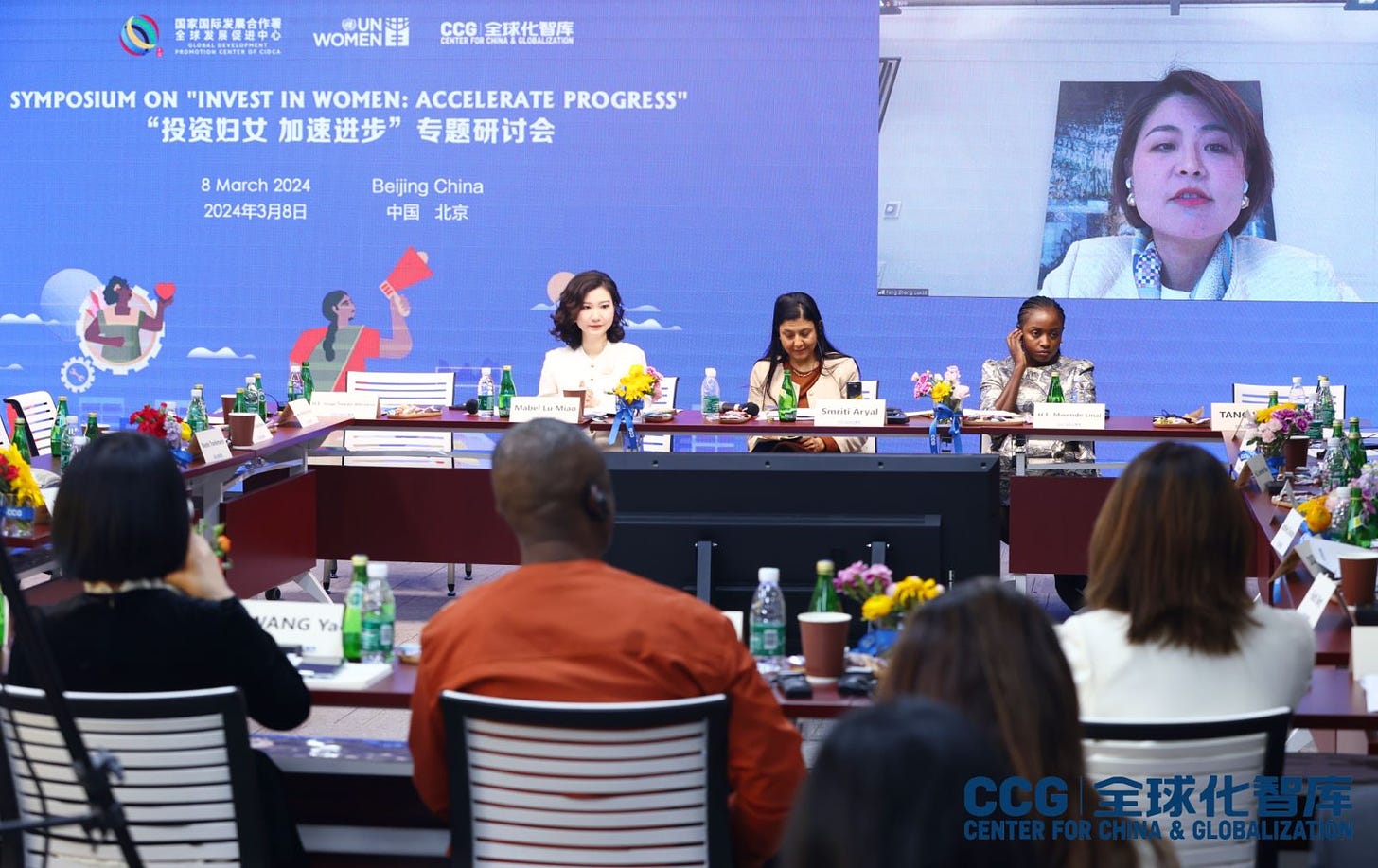
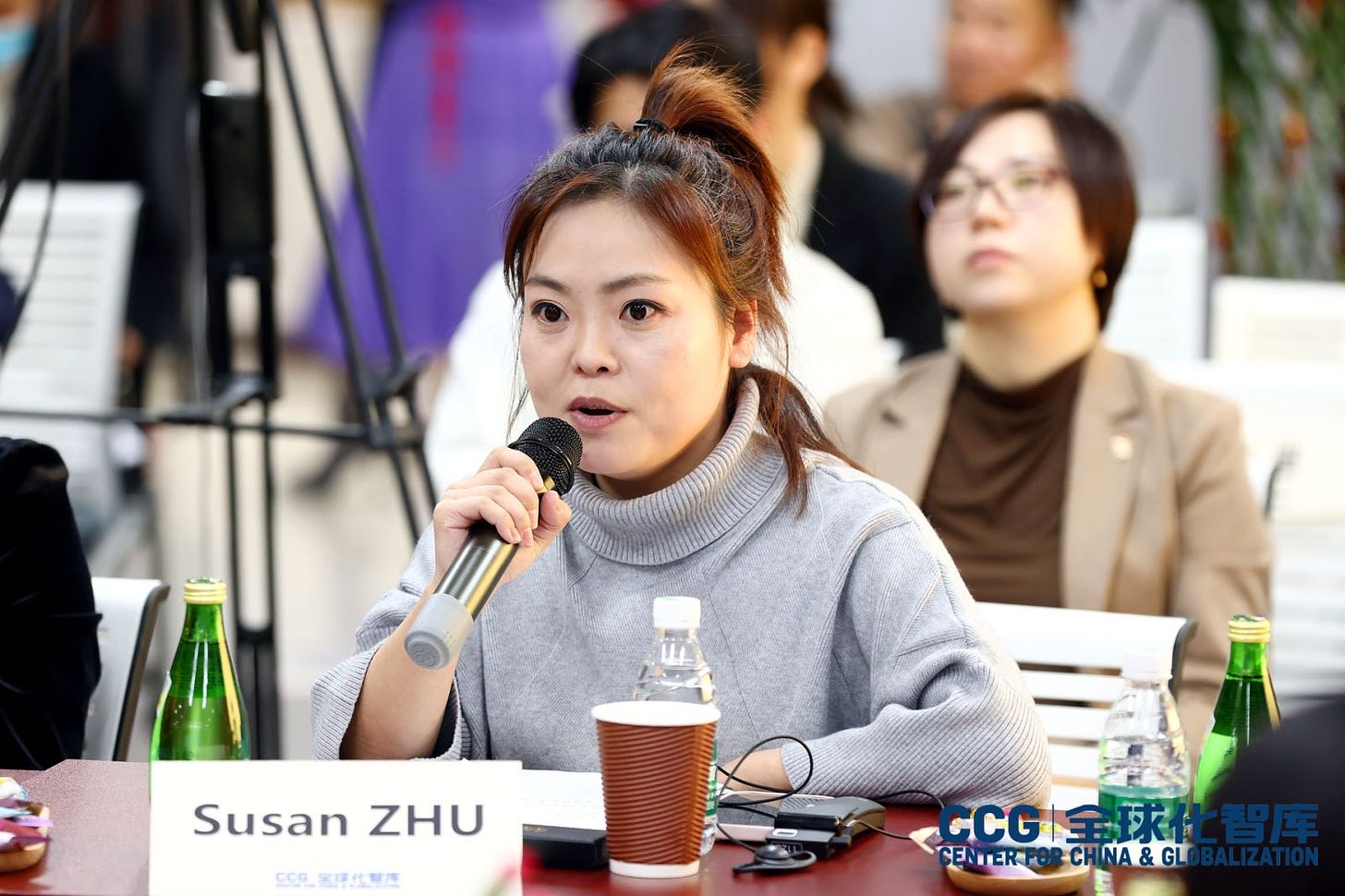

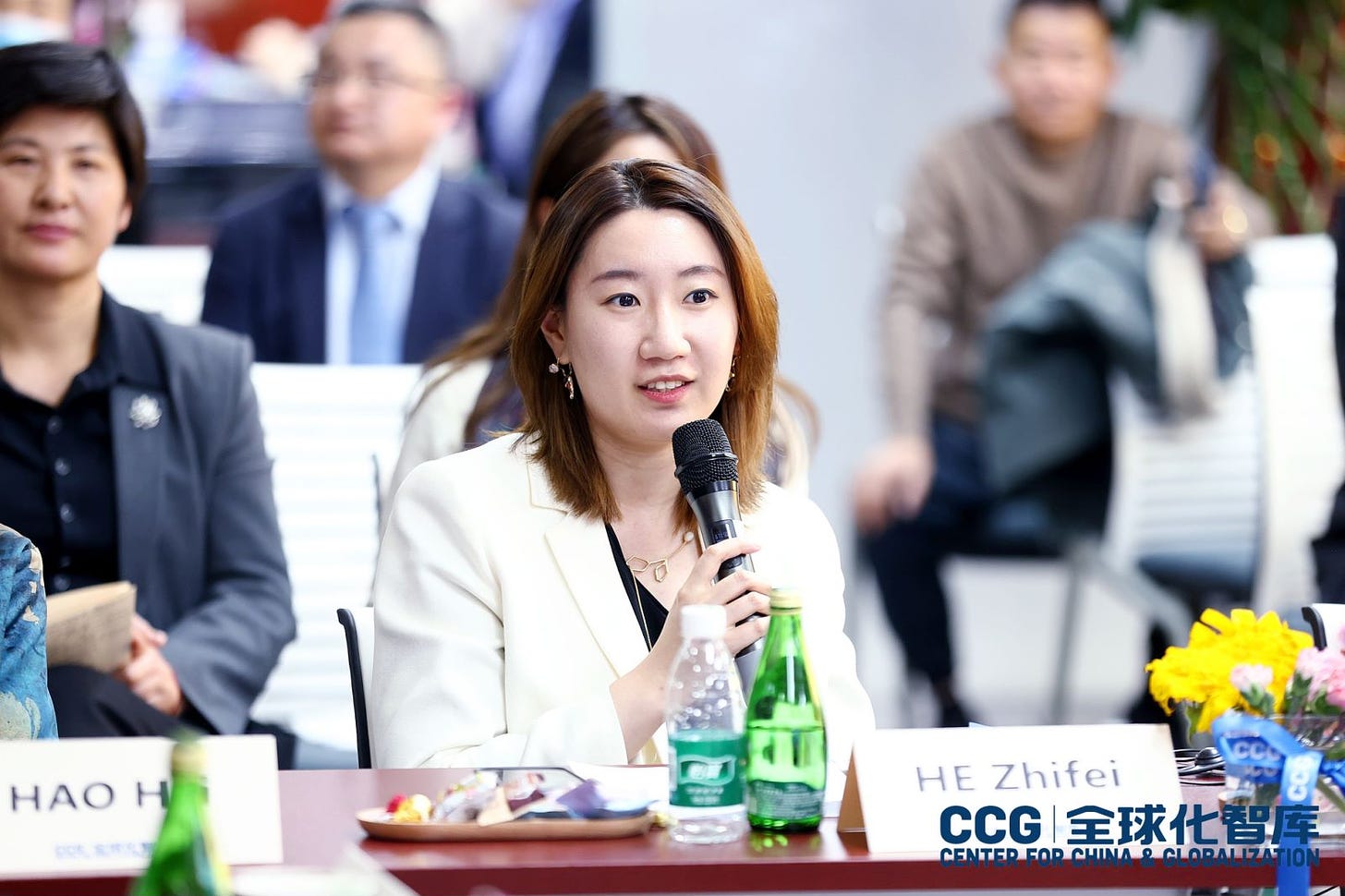
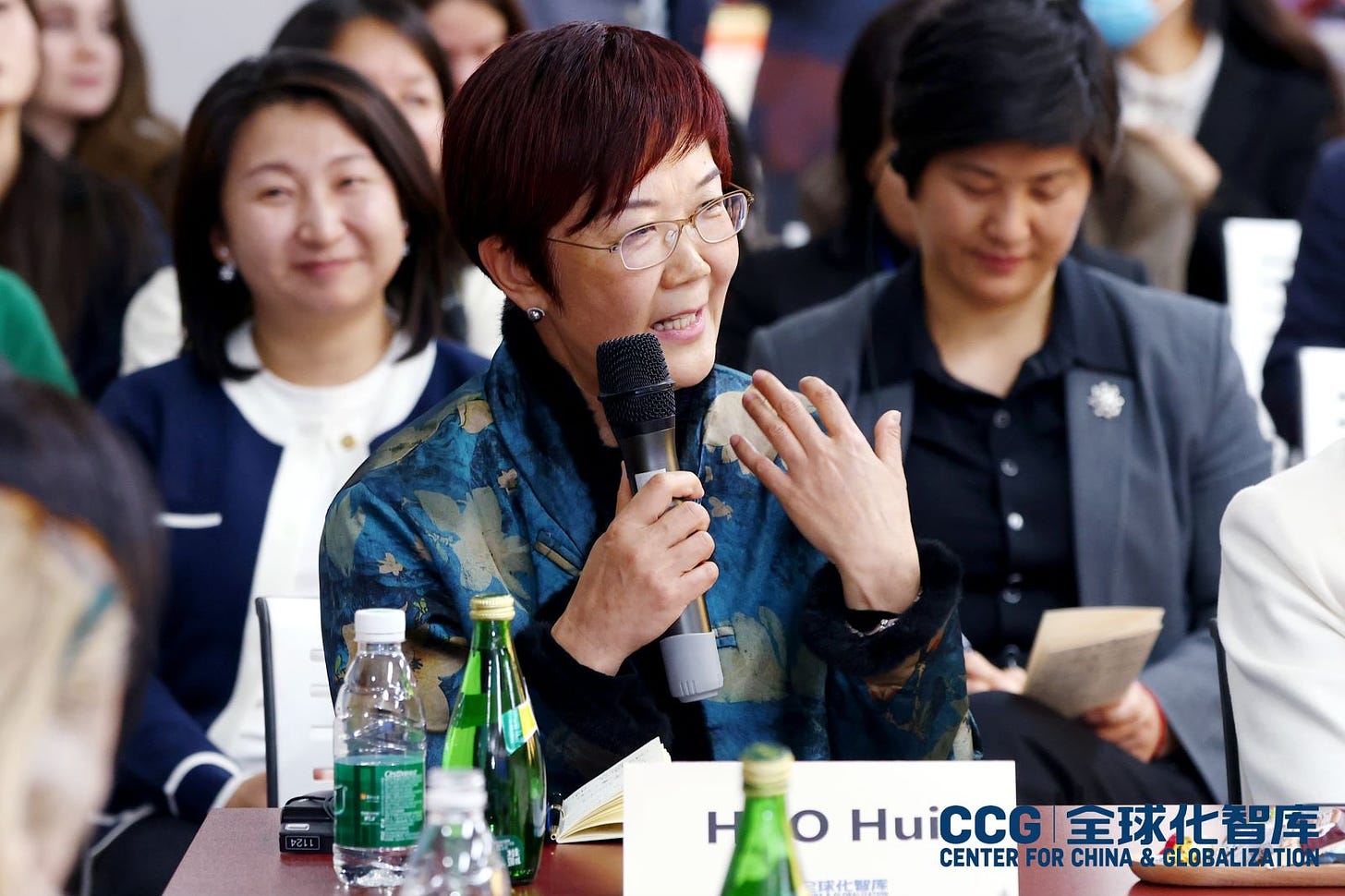
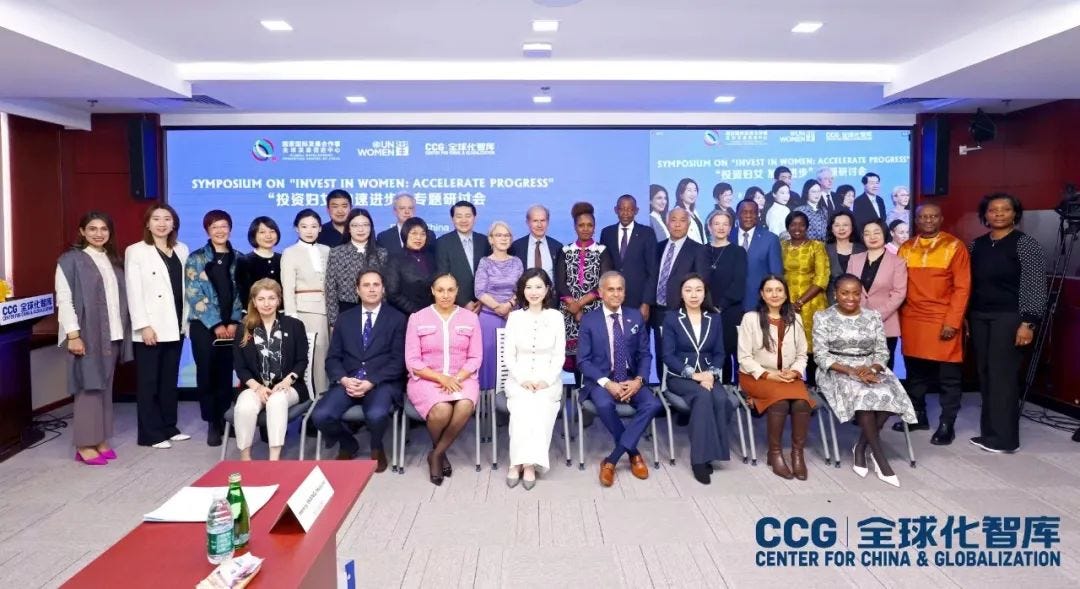
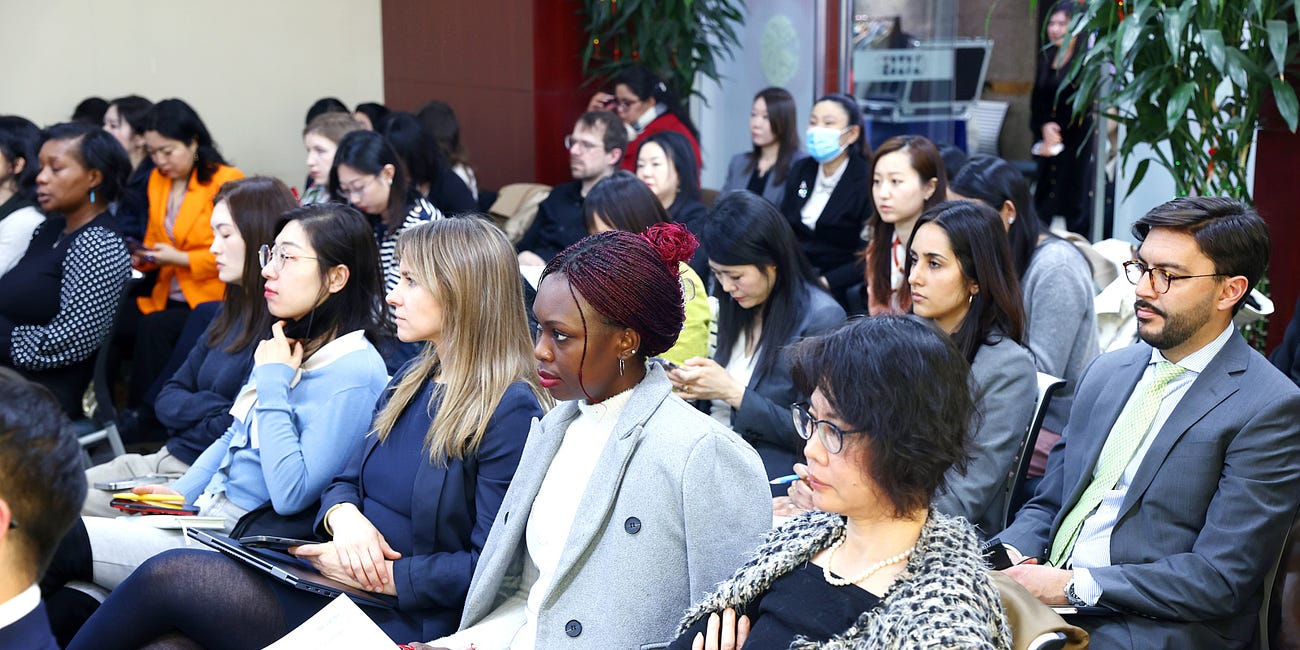
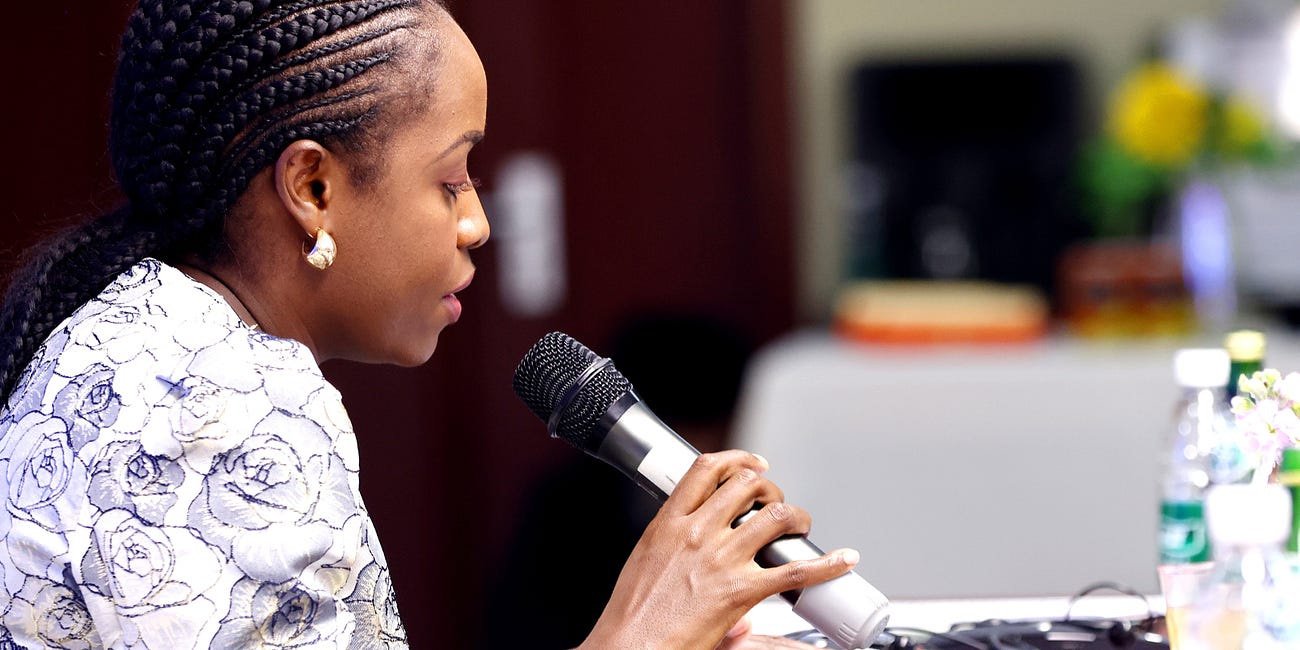




Kudos to our women globally